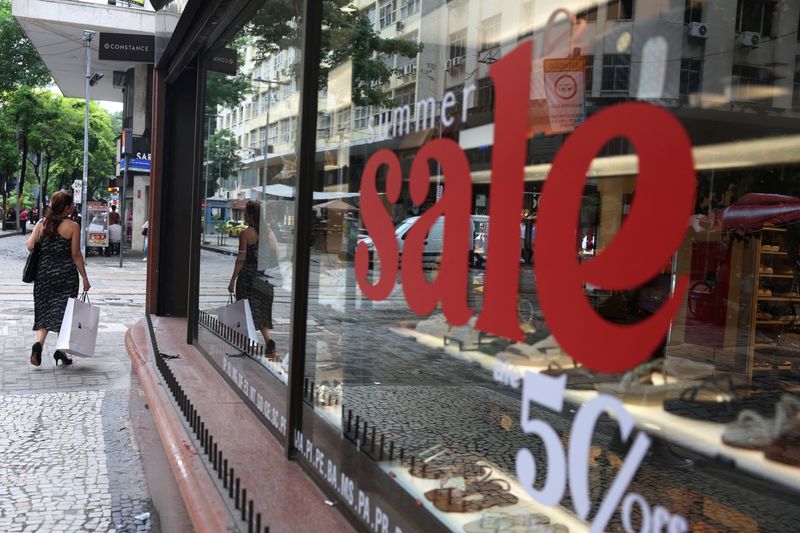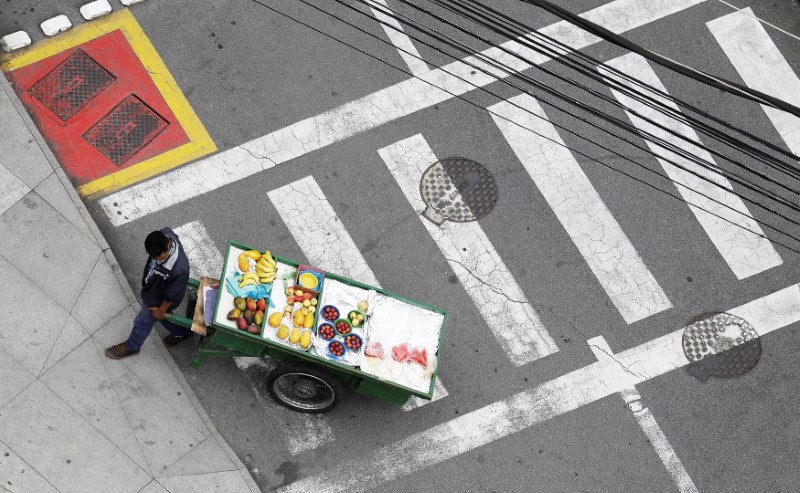By Marcela Ayres
BRASILIA (Reuters) -Brazil's economy rebounded in the first quarter from a sluggish second half of 2023 on stronger investments and consumer demand, official figures showed on Tuesday, adding to caution at the central bank, which has slowed the pace of interest-rate cuts.
The data boosted the outlook for Latin America's largest economy, but concerns remain about the impact of disastrous flooding in southern Brazil last month, which left a trail of destruction, opened the door to more government spending and pushed up food prices.
Brazil's gross domestic product (GDP) expanded by 0.8% in the three months through March, gaining momentum from a revised 0.1% contraction in the prior quarter, according to the government statistics agency IBGE.
Economic growth from the prior quarter was in line with the 0.8% median forecast in a Reuters poll of economists, while the 2.5% year-on-year rise exceeded the expected 2.2% growth.
The stronger momentum has been fueled by a robust labor market, which spurred household consumption 1.5% higher from the previous quarter, while government spending remained flat.
Fixed business investment also showed a recovery, rising 4.1% amid a monetary easing cycle that has cut the benchmark interest rate by 325 basis points since August last year.
Rafaela Vitoria, chief economist at Inter bank, said that the stronger domestic demand is consistent with the central bank's cautious stance since its decision to reduce the pace of rate cuts in May and stop providing forward guidance.
Hawkish comments from policymakers since then have led interest-rate futures to price in a pause in the easing cycle at the next rate-setting meeting this month.
On the supply side, Brazil's services-sector activity rose by 1.4% in the three months through March, compared to the previous quarter. Agricultural output surprised positively with a rise of 11.3% after a steep contraction in the second half of 2023. Industrial output decreased by 0.1%.
Juliana Trece, an economist at FGV Ibre, said the result was positive as robust growth was more broadly spread across sectors compared to the economic out-performance in 2023, which was far more concentrated around the benefits of a bumper harvest.
However, Trece warned that the tragedy in the southern state of Rio Grande do Sul, where recent storms and flooding killed more than 170 people and left nearly 580,000 displaced, "can and will impact the economy this year."
William Jackson, chief emerging markets economist at Capital Economics, said he doubts current growth rates will be sustained, as leading indicators point to a weaker second quarter. Brazil's Manufacturing Purchasing Managers' Index (PMI) dropped sharply in May and a key consumer confidence indicator has declined in recent months, Jackson noted.
The Finance Ministry acknowledged that growth is expected to slow in the second quarter, reflecting the floods in the south.
"Even with the positive result similar to that projected ... in the first quarter, uncertainties remain regarding the growth estimate for 2024," it said.

President Luiz Inacio Lula da Silva's government recently raised its GDP growth projection to 2.5% this year, while private economists forecast a 2.05% expansion in the central bank's weekly survey.
Both projections indicate a slowdown from the 2.9% growth in 2023, when a record agricultural performance boosted the economy.
